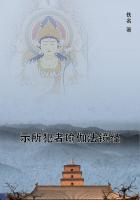Therefore, when one thinks the greater objects, in what will his thinking those differ from his thinking the smaller? (In nothing,)because all the internal though smaller are as it were proportional to the external. Now, as we may assume within a person something proportional to the forms (of distant magnitudes), so, too, we may doubtless assume also something else proportional to their distances. As, therefore, if one has (psychically) the movement in AB, BE, he constructs in thought (i.e. knows objectively) GD, since AG and GD bear equal ratios respectively (to AB and BE), (so he who recollects also proceeds). Why then does he construct GD rather than ZH? Is it not because as AG is to AB, so is O to I? These movements therefore (sc. in AB, BE, and in O:I) he has simultaneously. But if he wishes to construct to thought ZH, he has in mind BE in like manner as before (when constructing GD), but now, instead of (the movements of the ratio) O:I, he has in mind (those of the ratio K:L; for K:L::ZA:BA. (See diagram.)When, therefore, the 'movement' corresponding to the object and that corresponding to its time concur, then one actually remembers. If one supposes (himself to move in these different but concurrent ways) without really doing so, he supposes himself to remember.
For one may be mistaken, and think that he remembers when he really does not. But it is not possible, conversely, that when one actually remembers he should not suppose himself to remember, but should remember unconsciously. For remembering, as we have conceived it, essentially implies consciousness of itself. If, however, the movement corresponding to the objective fact takes place without that corresponding to the time, or, if the latter takes place without the former, one does not remember.
The movement answering to the time is of two kinds. Sometimes in remembering a fact one has no determinate time-notion of it, no such notion as that e.g. he did something or other on the day before yesterday; while in other cases he has a determinate notion-of the time. Still, even though one does not remember with actual determination of the time, he genuinely remembers, none the less.
Persons are wont to say that they remember (something), but yet do not know when (it occurred, as happens) whenever they do not know determinately the exact length of time implied in the 'when'.
It has been already stated that those who have a good memory are not identical with those who are quick at recollecting. But the act of recollecting differs from that of remembering, not only chronologically, but also in this, that many also of the other animals (as well as man) have memory, but, of all that we are acquainted with, none, we venture to say, except man, shares in the faculty of recollection. The cause of this is that recollection is, as it were a mode of inference. For he who endeavours to recollect infers that he formerly saw, or heard, or had some such experience, and the process (by which he succeeds in recollecting) is, as it were, a sort of investigation. But to investigate in this way belongs naturally to those animals alone which are also endowed with the faculty of deliberation; (which proves what was said above), for deliberation is a form of inference.
That the affection is corporeal, i.e. that recollection is a searching for an 'image' in a corporeal substrate, is proved by the fact that in some persons, when, despite the most strenuous application of thought, they have been unable to recollect, it (viz.
the anamnesis = the effort at recollection) excites a feeling of discomfort, which, even though they abandon the effort at recollection, persists in them none the less; and especially in persons of melancholic temperament. For these are most powerfully moved by presentations. The reason why the effort of recollection is not under the control of their will is that, as those who throw a stone cannot stop it at their will when thrown, so he who tries to recollect and 'hunts' (after an idea) sets up a process in a material part, (that) in which resides the affection. Those who have moisture around that part which is the centre of sense-perception suffer most discomfort of this kind. For when once the moisture has been set in motion it is not easily brought to rest, until the idea which was sought for has again presented itself, and thus the movement has found a straight course. For a similar reason bursts of anger or fits of terror, when once they have excited such motions, are not at once allayed, even though the angry or terrified persons (by efforts of will) set up counter motions, but the passions continue to move them on, in the same direction as at first, in opposition to such counter motions. The affection resembles also that in the case of words, tunes, or sayings, whenever one of them has become inveterate on the lips. People give them up and resolve to avoid them; yet again they find themselves humming the forbidden air, or using the prohibited word. Those whose upper parts are abnormally large, as.
is the case with dwarfs, have abnormally weak memory, as compared with their opposites, because of the great weight which they have resting upon the organ of perception, and because their mnemonic movements are, from the very first, not able to keep true to a course, but are dispersed, and because, in the effort at recollection, these movements do not easily find a direct onward path. Infants and very old persons have bad memories, owing to the amount of movement going on within them; for the latter are in process of rapid decay, the former in process of vigorous growth; and we may add that children, until considerably advanced in years, are dwarf-like in their bodily structure. Such then is our theory as regards memory and remembering their nature, and the particular organ of the soul by which animals remember; also as regards recollection, its formal definition, and the manner and causes-of its performance.
-THE END-














